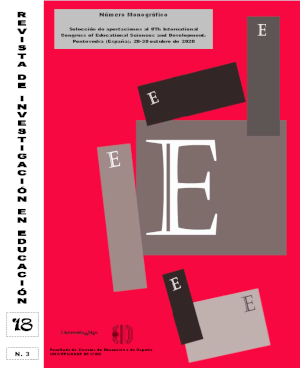Relación teoría-práctica y actividad común como focos para resolver problemas de educación: la significación del conocimiento de la educación no ampara el modelo dual (Versión en inglés)
DOI:
https://doi.org/10.35869/reined.v18i3.3265Palabras clave:
Conocimiento de la Educación, Modelo de Crecimiento del Conocimiento de la Educación, Significación del Conocimiento de la Educación, Principios de Metodología de Investigación, Relación Teoría-Práctica, Función Pedagógica, Teorías de la Educación.Resumen
This work insists on the importance of the study of theory-practice relationship to obtain specialized and specific knowledge of education: pedagogical knowledge.
Education is a real field that people may know in different ways, forms, and types. Several types of knowledge and rationality are useful for making knowledge of education: philosophical theories, practical theories, applied research, substantive theories have let them build it. To a higher extent, knowledge of education has already made particular and specific concepts.
This study establishes differences between knowledge of education and knowledge of disciplines which are used in educative process. Besides this, it emphasizes and upholds the Educational Knowledge Growth Model.
The second half of this work continues to explain the different possibilities that each current of knowledge of education has, for solving the problems which arise in the intervention, regarding to theory-practice relationship.
All this has been made by focusing the discussion about the theory- practice connection in three different pedagogical currents (marginal, subaltern, and autonomous).
Signification as a principle of methodology is a problem derived from how the theory-practice relationship is understood in each current of knowledge of education to justify valid knowledge.
By executing the external common activity, we improve and train the internal activities-capacities: without the activity it is impossible to educate and through the activity it becomes possible for the educatee to be an actor-agent and an increasingly better author-agent of his own projects and acts.
We shall see how the pedagogical function generates intervention by means of internal and external common activities. And we can conclude that common activity and theory-practice relationship are focuses to solve education problems from pedagogical intervention, which always implies knowledge and action.
Descargas
Descargas
Publicado
Número
Sección
Licencia
El copyright de los artículos publicados pertenece a la Facultad de Ciencias de la Educación y del Deporte de la Universidade de Vigo. La aceptación del trabajo para su publicación implica que los derechos de impresión y reproducción serán propiedad de la Revista. La revista permite al autor depositar su artículo en su web o repositorio institucional, sin ánimo de lucro y mencionando la fuente original. Las condiciones de uso y reutilización de contenidos son las establecidas en la licencia Creative Commons CC BY-NC-ND 4.0 (Reconocimiento - No Comercial - Sin Obra Derivada).



